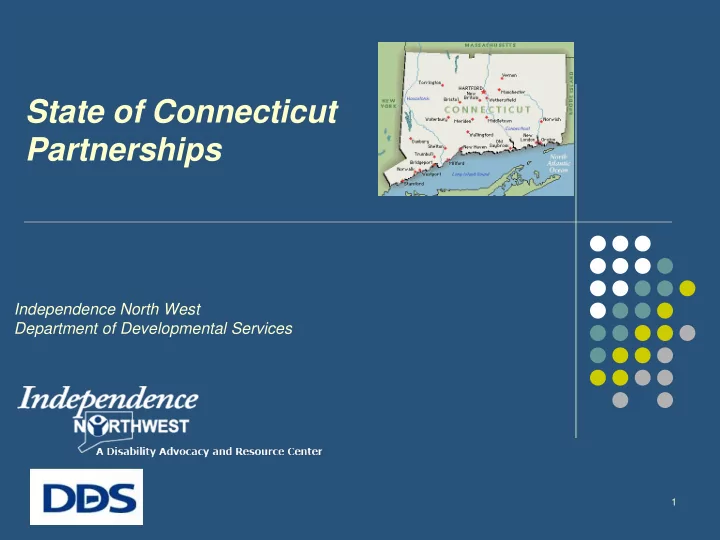

State of Connecticut Partnerships Independence North West Department of Developmental Services 1
Overview of ADRC in CT Aging and Disability Resource Centers (ADRCs) serve as single points of entry into the long-term supports and services system for older adults and people with disabilities. Sometimes referred to as “ one-stop shops” or "no wrong door" systems, ADRCs address many of the frustrations consumers and their families experience when trying to find needed information, services, and supports. Through integration or coordination of existing aging and disability service systems, ADRC programs raise visibility about the full range of options that are available, provide objective information, advice, counseling and assistance, empower people to make informed decisions about their long term supports, and help people more easily access public and private long term supports and services programs. 2
Overview DDS CT • DDS CT serves Individuals with Intellectual Disability, Developmental Disabilities, Autism(2006) and Prader Willi Syndrome • 21,000 individuals across the lifespan • 5000+ Birth to Three • 16,000 three and older • 10,000 approximately receiving services under HCBS waivers • Most individuals receive their services in a family or own home • Operates 4 different waivers • Case management provided by Public staff 3
Vision Common vision among many stakeholders – integrated supports and services regardless of age and disability . 4
External Forces can lead to Collaboration and Partnerships Supreme Court decisions, Affordable Care Act and other rulings Increasing preferences for community living Increased quality of life for those who choose to and transition to community after nursing home stay Increasing preference for employment Increasing availability of technology Increasing aging population relative to population under 65 Increasing cost relative to Medicaid budget 5
How will trends impact future? CT worked with Mercer Consulting they prepared a report documenting projections at a town level to assure our decisions are ‘data driven’. 6
Why is this important? Each town or group of towns in Connecticut will have a long-term care compendium of supports and services. 7
Stakeholders Providers Participants Nursing facilities Elders Hospitals Persons with disabilities Home care Advocates Steering Committee State agencies Dept of Public Health Resources Dept of Developmental Services Federal government Dept of Mental Health and Addiction Foundations Services Not-for profits- ADRCS Department of Rehabilitation Services State taxpayers Dept of Economic and Community University Development Office of Policy and Management 8 State Department on Aging
Opportunities Strong network of providers; Federal grants; Assistive Technology; Synergistic partnerships Specific examples of partnerships 9
MFP has helped us partner! Intellectual Non-demo, Disabilities, 150 46 Mental Health, Elder, 585 154 Physical Disability, 571 10
Where do MFP Participants Choose to Live? No Home residence owned by reported 1% Apartment - participant Home assisted 6% owned by living 2% family member 13% Group home 2% Apartment - not assisted living 75% 11
Transition Challenge Categories Consumer Mental Health Engagement 14% 13% Waiver Program 12% Physical Health 17% Other 2% Housing 11% Legal Issues MFP Office 4% 3% Services and Other Involved Financial Supports 8% Individuals 4% Issues 6% Facility Related 6% 12 12
What is CT doing? Create parity across age and disability resources based on functional support needs rather than diagnosis Create common comprehensive assessment Close service gaps and improve existing services or identify new services to better serve the needs of all populations Integrate employment into home and community based services Create mechanisms to ensure quality in the care provided through HCBS Assure conflict free case management Build, improve quality of provider networks aligned with the principles of person centered planning Informed risk 13
Next Steps What will your community look like? How will we create a partnership? 14
Contact information DDS of Ct Siobhan.Morgan@ct.gov Independence Northwest Bob Gorman Bob.gorman@independencenorthwest.org (203) 729-3299 ex. 24 15
Recommend
More recommend